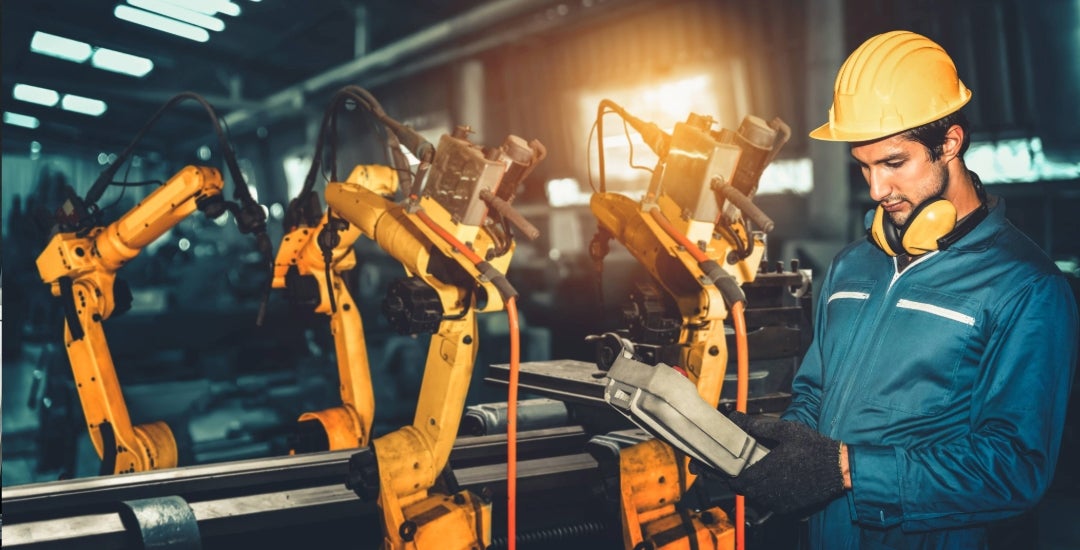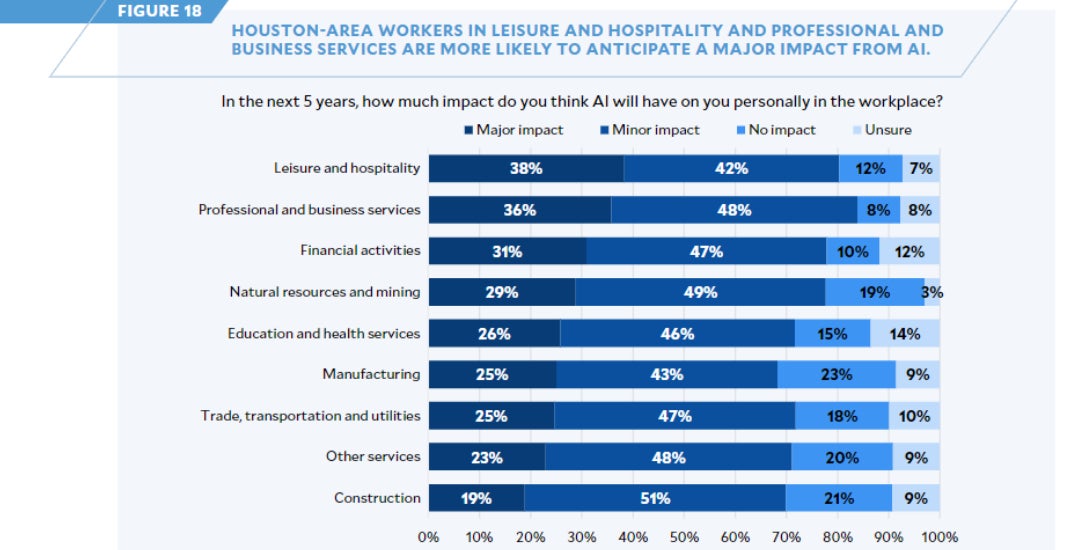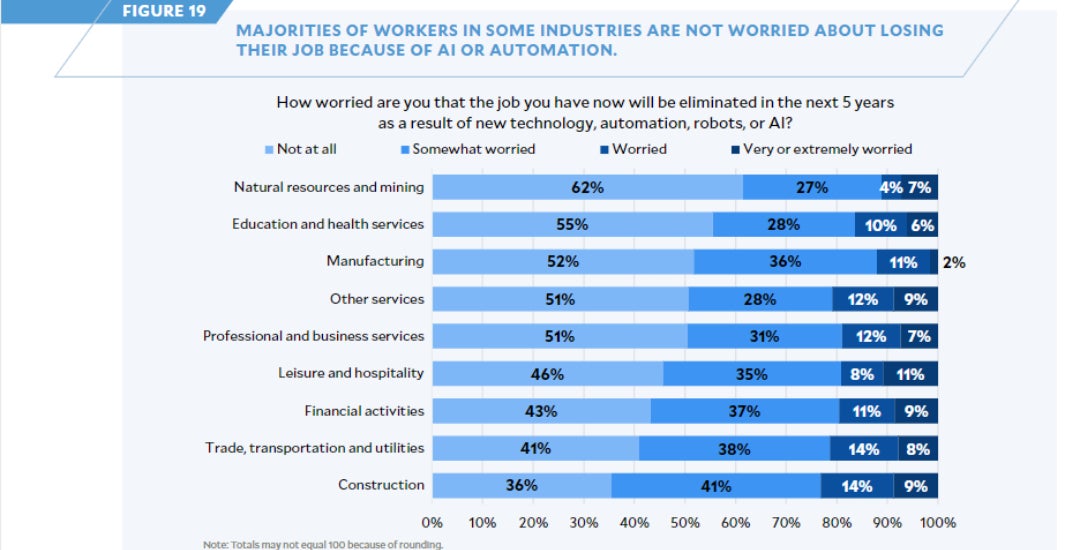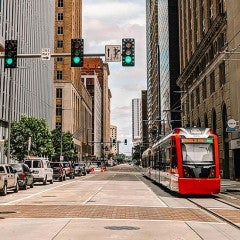This post is part of a series highlighting the findings from the 2024 Kinder Houston Area Survey.
While there is less agreement on the type of impact AI will have, there is a consensus that it will be disruptive. In particular, 60% of Houston-area residents think AI will replace workers in some occupations. At the same time, just half feel AI is a threat to their own jobs. Only 7% said they were worried or extremely worried that AI, automation or robots will take their jobs away in the next five years.
“While that number may seem low,” said Dan Potter, senior director of research at the Kinder Institute and lead researcher of the Kinder Houston Area Survey. “That still translates to about 174,000 Houston-area workers who don’t think their job will be around much longer – if even half of those jobs are eliminated, that would nearly double the number of unemployed people in the county from where it is today.”
Moshe Vardi, the Rice University Professor and George Distinguished Service Professor in Computational Engineering, is a thought leader in AI with a lengthy publishing history on the topic, with articles such as “Are robots taking our jobs?” in 2016 and “What the Industrial Revolution really tells us about the future of automation and work” in 2017.
He said Houston’s labor force may not realize the benefits or pitfalls of AI within the next five years, but its ascent is inevitable and will create a seismic shift beyond Houston.
“The change will be slower than we think, but will be deeper than we think,” Vardi said. “Technology is going to change the world at its own pace, and the world is going to wait. The internet changed our lives in a very profound way. AI will change our lives in an equally, if not more, profound way.”
In “The Future of Jobs Report 2023,” published by the World Economic Forum, 75% of companies globally said they planned to further integrate AI into their day-to-day operations. But technological advances, especially automation, have led to income inequality, according to a 2021 analysis, “Tasks, Automation, and the Rise in U.S. Wage Inequality,” published by the National Bureau of Economic Research.
In “The Future of Jobs Report 2023,” companies projected that 26 million jobs will be lost to automation and digitalization by 2027. Those most likely to suffer job losses include cashiers and ticket clerks; data entry clerks; accounting, bookkeeping and payroll clerks; and administrative and executive secretaries.
“I’m convinced we’re going to see AI increase productivity, and the GDP will increase,” Vardi said. “What we have seen happen over the past 40 years is that even when the economy is strong, prosperity is not necessarily shared."
To ensure equity, stronger connections must be made between higher education and the economy to adequately develop and invest in the skills that are in demand. The most important program at every university could be continuing studies, Vardi said.
“We need to think of continuing studies as lifelong learning,” he said. “There’s no way the skills you learned in four years of college, and maybe two years of a master’s program, will serve you for the rest of your life. Think how much the world of today is different from the world of 40 years ago. That means we can expect the world in 40 years to be just as different.”
Kinder Houston Area Survey respondents were cognizant of how AI and similar technology will require additional training, as 70% said they expect they will need to upgrade their skills. Residents who work in construction, natural resources and mining, and financial activities ranked as the top three groups who expressed a need to expand skill sets.
Throughout all sectors of labor in Houston, workers expect AI to make at least a minor impact in their workplace, with 51% of construction workers ranking the highest and 42% of leisure and hospitality workers as the lowest.
When asked to predict whether AI’s impact on the workplace will be major, minor or none at all, service industry employees represented the highest number of respondents who believe AI will have a major impact at 38%, followed by 36% of professional and business service employees and 31% of people who work in financial activities.
Residents who worked in the hospitality industry had the highest levels of worry about losing their jobs to AI, with 11% of workers reporting they were very or extremely worried. In financial activities, construction and other services, 9% were very or extremely worried, and 8% of the trade, transportation and utilities workforce expressed the same sentiment.
Remington Tonar is the co-founder and chief growth officer of Cart.com, which provides commerce, retail and logistics software and services to help companies sell and distribute goods. Cart was established in Houston in 2020, and its headquarters are near the Energy Corridor. Tonar is also an adjunct professor at the Jones Graduate School of Business at Rice.
Cart’s customers range from household names like PacSun and Toms to pharmaceutical companies and the U.S. government. Cart uses AI in several ways across its software services. One example is by comparing real-time data to historical data to perform predictive inventory and demand planning for its customers.
“One of our customers may say, ‘We know sales of this red T-shirt are going to go up next week by 10%, so we need to order more red T-shirts this week so we have enough to cover that,’” Tonar said. “We’re also using AI in interesting ways to help merchants list across channels more easily. We can take a product catalog, use large language models and very quickly translate it so that it is going to be effective on Amazon, eBay, Walmart, Shopify or other channels. In some cases, that typically takes hundreds of human hours to do manually.”
While a proponent of AI, Tonar said it will ultimately be up to its users to determine if it is employed for good or ill. To improve AI, users will have to actively work on training out AI bias by feeding it diverse inputs to train and retrain its algorithms.
“People who have a somewhat skeptical view of AI are maybe those who have been exposed to uses of AI that did not work out in their favor,” Tonar said. “As a society and as employers, it's incumbent on us to really think about how we constantly maximize opportunities for human beings, so that they have opportunities to advance even as we are adapting to new technology and increasingly deploying AI automation.”
With the 2024 Kinder Houston Area Survey looking ahead to Houston's future, it weighed how AI in the workplace, climate change and the energy transition will factor into the coming decades. Seven in 10 respondents reported excitement about the potential opportunities that the future represents, compared to 3 in 10 who were worried that the Houston of the future will leave them behind.
When it comes to the use of AI, Vardi said inclusivity is imperative for everyone’s future.
“If we follow the Gartner hype cycle, there is a peak of hype, followed by a valley of disappointment and then the plateau of contentment,” Vardi said. “I think we’re at the peak of hype, but in the long term AI will be a huge game-changer.
“The question for us as a society is, can we do better than we did over the past 40 years? If we don’t do that, there are dangerous political consequences. For democracy to work, there has to be a sense we are somewhat in it together. People need to feel like they’re benefitting from the economy, and not being left behind.”





